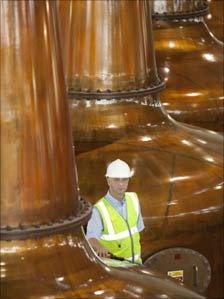New distillery sees off recession
- Published
The investment is a sign of booming markets for Scotch whisky
The first large new scotch whisky distillery for more than 30 years has produced more than 10 million litres of spirit in its first year.
With demand for whisky growing through the recession, its owner Diageo, said it may make further investments.
Roseisle, near Elgin, cost £40m to build and features 14 large copper stills made by Abercrombie's in Alloa.
It is part of a £100m package of investment to expand capacity and meet growing global demand for whisky.
Diageo, which has the largest share of the whisky market, said it had space for further expansion but still may have to consider another similar new investment within five years.
Chief executive Paul Walsh told BBC Scotland: "If we continue to see economic improvements and the rate of growth in Scotch is sustained, we'll be looking at further investments in distilleries".
Construction on the site of an established distillery and maltings began in 2007 and was complete in spring last year. The design drew on experience at Diageo's 27 other malt distilleries in Scotland.
However, it also includes innovations including pot stills constructed in replaceable sections as copper wears out. Roseisle has a choice of copper and steel condensation chambers, giving distillers the option of making light or heavy spirit for different characteristics within each blend.
Most by-products are re-cycled on site, with biomass burned to produce its energy and biogas produced from anaerobic digestion.

The Roseisle distillery features 14 large copper stills
Its output, which is still being matured before the first casks can be put on the market from 2012, is to be used in blended whiskies, including Johnnie Walker. There are no plans to market Roseisle as a single malt brand.
Speaking ahead of the official opening, Diageo chief executive Paul Walsh told BBC Scotland: "We've tried to combine the artisanal values of distillation with modern technology, and in so doing making sure we have the best quality and the best environmental footprint imaginable".
While the plant employs 25 people, and takes only 10 to run production, he defended his company's efficiency drive which saw the closure of Port Dundas distillery in Glasgow and the winding down of the Kilmarnock bottling plant.
"I feel for the individuals affected. We've done our utmost to offer employment elsewhere, but closures are part of a bigger growth plan," he said.
"Scotch is growing, contributing £99 per second in exports for the British economy. It's incumbent on us as leaders in the Scotch whisky industry to ensure we are positioned for the next 15 years".
With growth strong in emerging markets, Mr Walsh continued: "I'm very very excited about the prospects for Scotch. In many markets around the world, Scotch is seen as combining the wonderful attributes of authenticity, heritage, provenance, together with a lifestyle product.
"It's something people aspire to".
- Published23 September 2010
- Published16 September 2010
- Published30 May 2010